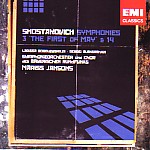I’m frankly amazed (but not really surprised) that in this economically difficult time EMI releases two recordings of the intimidatingly grim Fourteenth Symphony. Still, this issue gets my vote as the finest thus far in Jansons’ ongoing Shostakovich cycle. He hasn’t quite the sheer lyrical sumptuousness of Rattle’s Berlin recording, but this version has even greater intensity–and happily uses the original Russian, rather than the musically nonsensical multi-lingual edition of the poems. Indeed, in Malagueña and Loreley the only recording that comes close is Rostropovich’s on Teldec. More to the point, Jansons clearly has the finest soloists since that storied version (dating from the time of the symphony’s Russian premiere) and he’s very beautifully served by the typically adept Bavarian Radio engineers.
Bass Sergei Aleksashkin sings magnificently, with refulgent tone from bottom to top: and he really has a bottom, unlike so many others who have taken this role. But despite the largeness of his sound, he’s amazingly nimble, whether narrating Loreley or hurling insults in The Zaprozhian Cossacks’ Reply to the Sultan of Constantinople. He really pours on the tone in O Delvig, Delvig! This just may be the most heartfelt account of that song yet recorded. Soprano Larissa Gogolevskaya isn’t far behind, interpretively. Her timbre is very Slavic and a touch raw–aptly so in this case–but she has two big pluses: she controls her sound and sings very beautifully in soft dynamics, and her upper register is surprisingly open and easy. That makes The Suicide particularly moving, while she really does come across as psychotic in On Watch–her way with the text is incredibly communicative, rivaling Vishnevskaya at her best.
Jansons coaxes uniformly excellent string playing from the Bavarian orchestra, both here and in the Third Symphony, which also receives what arguably is its finest performance on disc. From the opening clarinet duet it’s clear that Jansons takes the music seriously, never mistaking its experimental qualities for a lack of inspiration or technical weakness in execution. Yes, the piece has no discernible form (it was Shostakovich’s intention to write a piece without any repetition of themes) and the closing chorus is monumentally uninvolving, but the interpretation really does make you forget all of that and simply revel in the terrific playing (and singing). Jansons makes the music sound as if it really matters, and no praise can be higher than that. This is an outstanding release, from start to finish. Indeed, if I had to choose a single version of the Fourteenth Symphony (and there are quite a few very fine ones) to set alongside Rostropovich’s, this would be the one. [8/7/2006]
































